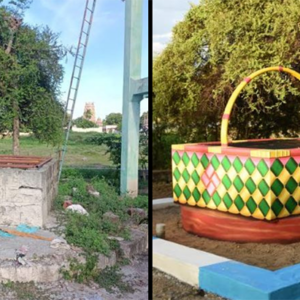
There is nothing more sobering than understanding just how serious the world’s climate issues are, so if someone or a bunch of people manage to create a desalination plant that turns seawater into normal water, then you know it’s pretty awesome business, especially since the earth’s water is only 3% fresh.
Finnish water technology company, Solar Water Solutions (SWS) has gotten closest to turning seawater into fresh water, without actually polluting any surrounding areas. In fact, it’s managed to create a filtration system that provides fresh water via an exceptional non-polluting desalination technology at both zero-emissions and zero-running cost.
This new system is being utilized in Kitui County, Kenya, run by a Dutch group called Climate Fund Managers. The goal is to provide water to at least 400,000 locals in the area by the year 2023.
Moreover, the SWS has managed to fit their desalination plant into a shipping container, which makes it incredibly efficient and easy to send 200 units to the area of Kitui. The plant’s technology has the ability to convert 4,000 and 7,000 liters of seawater per hour, or 10,000 liters every hour of the brackish water, powered completely by solar panels.
Antti Pohjola, CEO of Solar Water Solutions said, “Through this partnership with CFM and locally with Kitui County… we can together revolutionize access to safe affordable water in rural Kenya. This project marks a breakthrough in solar-powered water infrastructure.”
He went on to say, “It wouldn’t have happened without the four key elements. A sustainable technology that brings down the cost of clean water, access to finance with a leading institutional investor, local partners, and a market-based business model.”
According to the SWS, their reverse-osmosis method was incredibly effective, but unfortunately the outcome was also dangerous to both natural and human environments.
In fact, one particular review from back in 2007 proved quite critical, explaining that ‘the reverse osmosis membranes are susceptible to fouling and scaling must be cleaned with chemicals that may be toxic to receiving waters.’ It also explained that the byproduct, or the desalinized water, is often contaminated brine that’s even ‘twice as strong as regular seawater’ that happens to be incredibly deadly to the surrounding plant matter in that area.
The SWS has also designed their plant to need incredibly minimal maintenance, while one of the company’s spokespersons explained that they only use non-toxic cleaners on the membranes such as citric acid.
Moreover, they share that for as long as the byproduct brine is properly discarded, then there should be no damage to the ecosystem while going through the desalination process.
To see more about the SWS project, click on the link found here.
What are your thoughts? Please comment below and share this news!
True Activist / Report a typo


